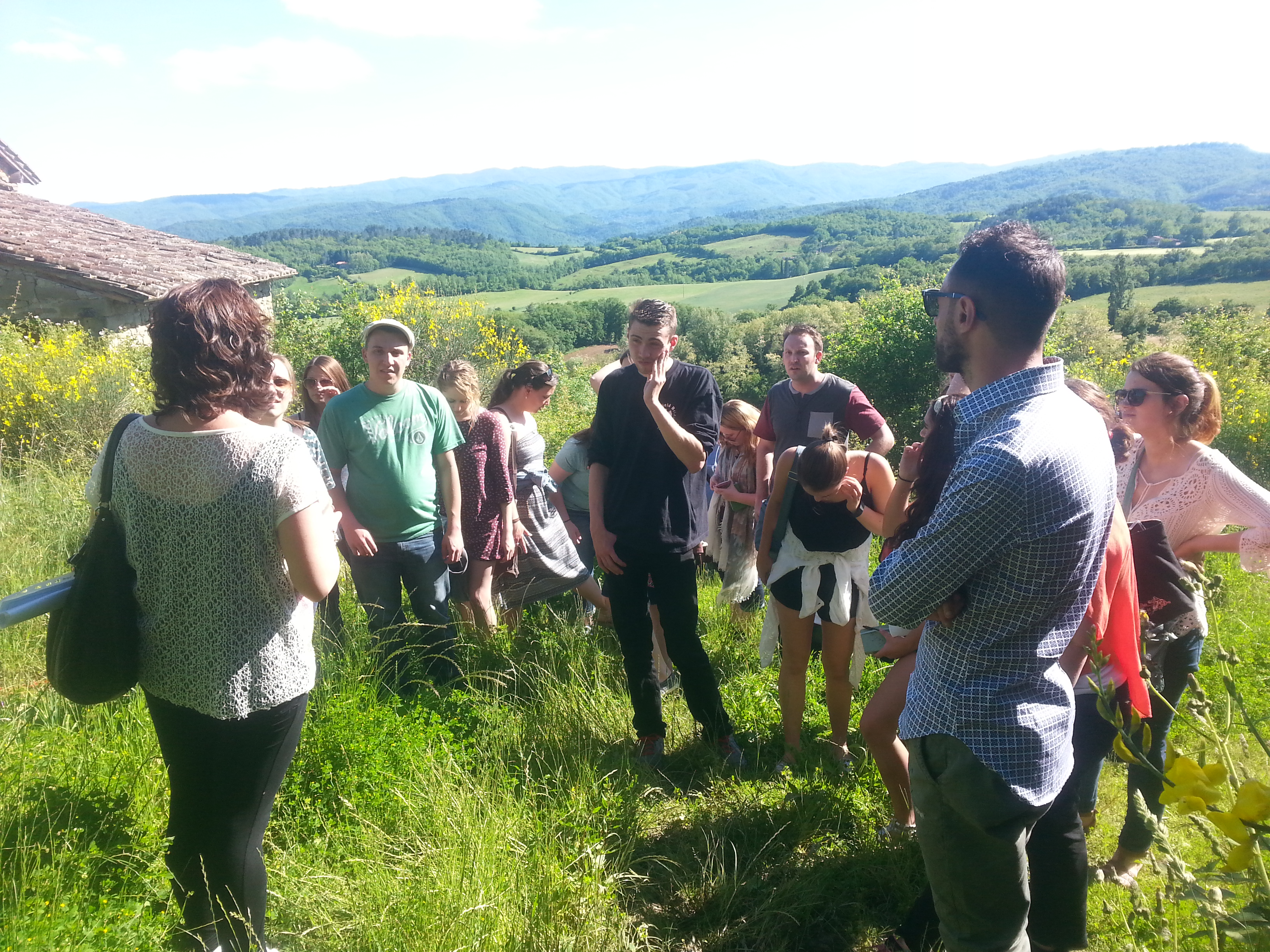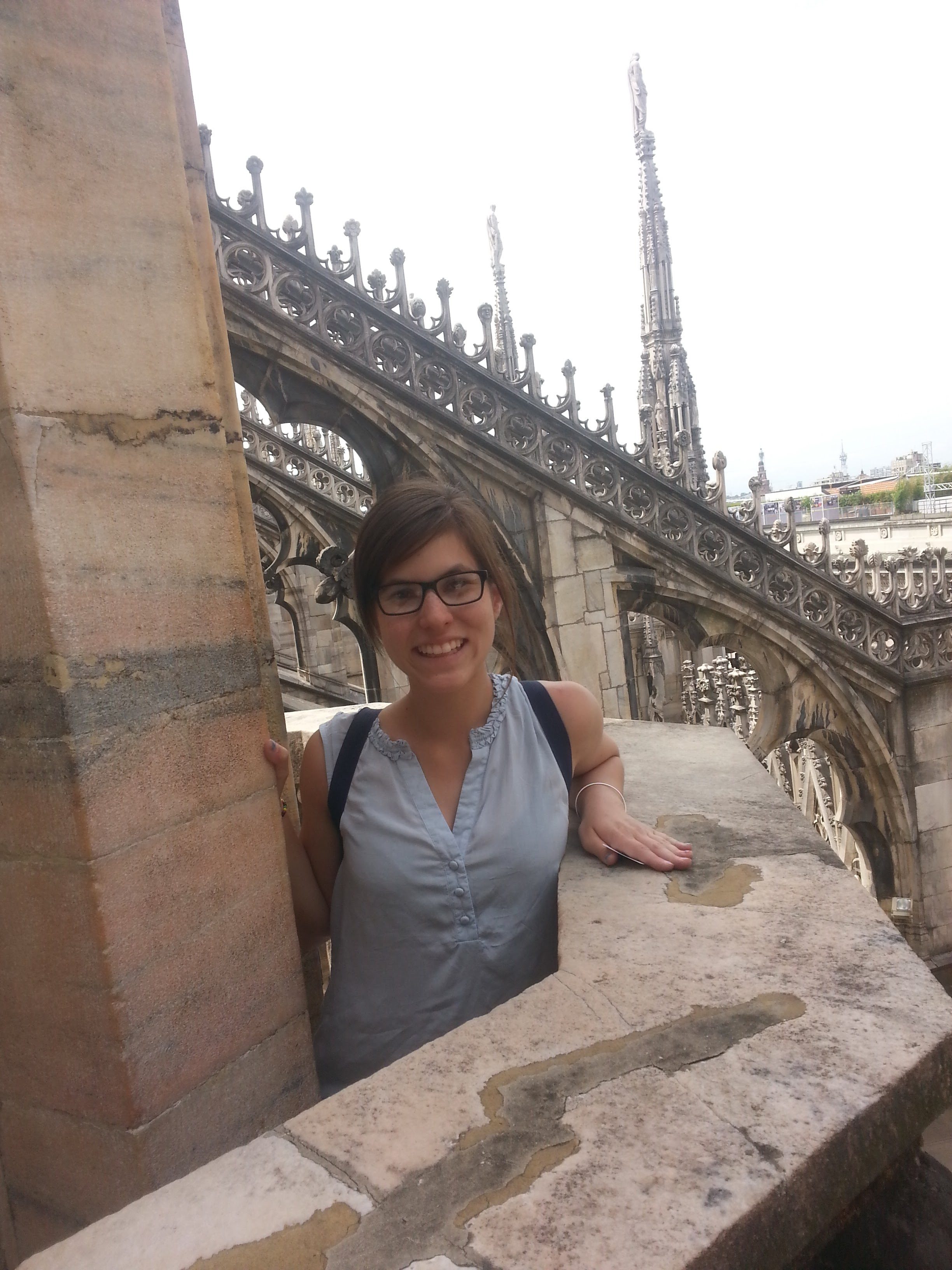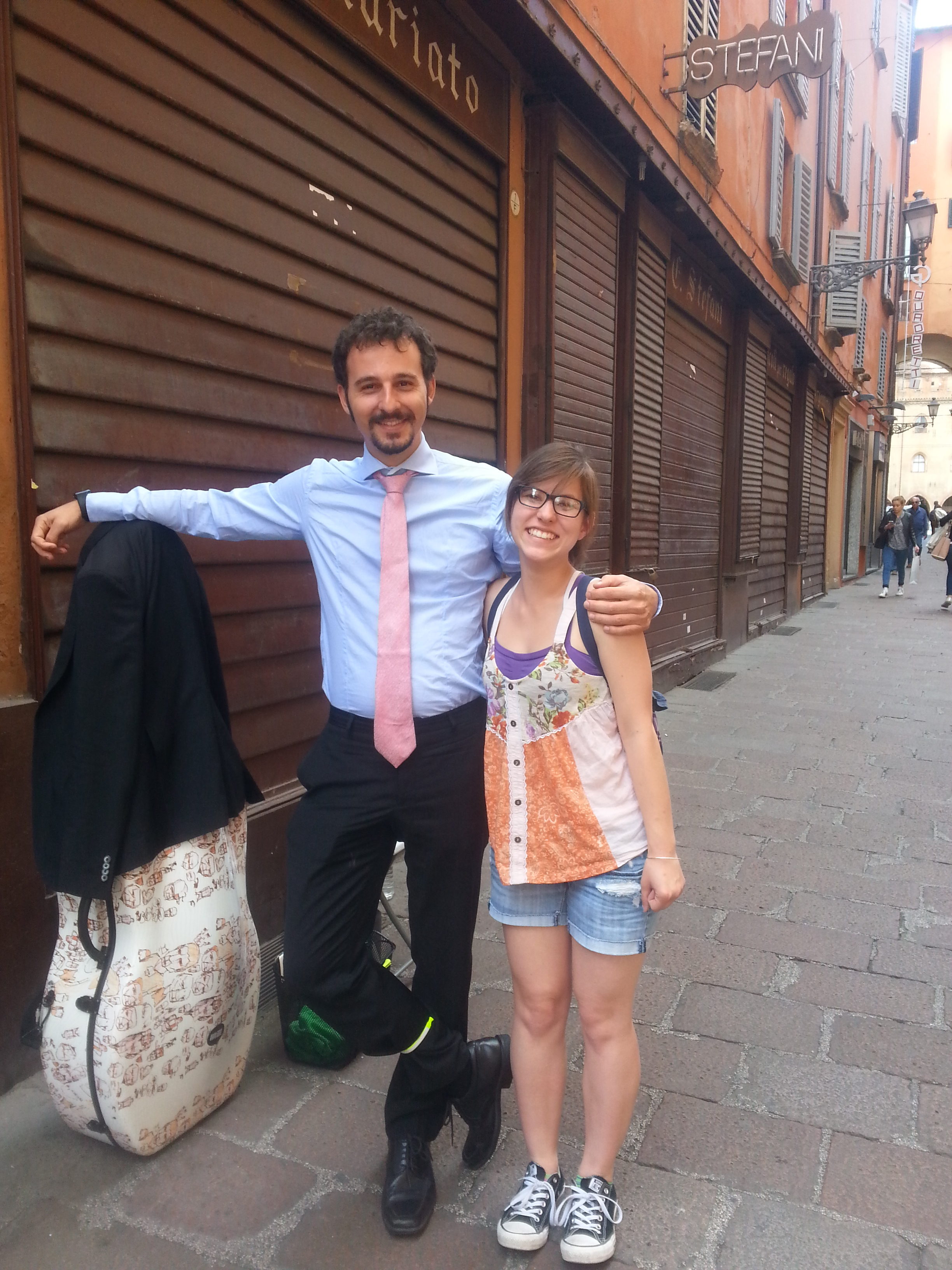Author: Mary Carol Isabell
Our last day in Italy was spent in Milan. After walking up the numerous stairs, I stepped into the sunlight and saw for the first time the skyline of Milan in the background of the hundreds of spires of the Duomo. White marble provided an ancient frame for the relatively new city that lay behind it. The gothic structure was the most intricate piece of architecture my young eyes had ever seen. Hundreds of statues decorated the building, every carving and boarder carved into the stone was individual from the next. The marble was warm in the sunlight. The air shimmered in the distance with the heat. I was surrounded by ancient carvings, hundreds of feet off the ground. For all intents and purposes, I was on top of Milan. I felt like I was on top of the world. I could not stop taking pictures. As I ducked through the doorway to get to the next section, I knew that any photo I took would not do the structure justice. I could only capture my friends and myself in this moment. I needed to document our brief time above Milan so that we could refresh our memories down the road. Ducking into a gutter, I watched the city from the shade. My small stature gave me the ability to catch some respite from the elements in the most interesting of places, and I relished the fact that I was the only person with my particular vantage point. I stepped onto the banister, making myself approximately 3 inches taller than normal, and spread my arms wide. I embraced Milan from the top and imagined that I was embracing Italy as well. My small embrace hopefully showing Italy the gratitude and elation I felt. Thousands of miles have been traveled and hundreds of years have passed in order for me to be here, on top of the world.
...If you don’t ask, you won’t receive. And also, the worst they can say is no, then insult your intelligence. Maybe. Bologna was a city where if you asked, even in your head, you seemed to receive. Time was running out and we had two cities left- two more cities to find a cellist. Bologna obliged with a cellist playing the theme song to Game of Thrones and the Lord of the Rings soundtrack… I was in heaven and seeing him play on the streets made my heart happy. What made me happier was to see my friends listen with wonder as well. I didn’t get his name but he wa s living the dream. “I live in a motor home. One day I’ll be playing here… next week I could be in Florence for a week, then on to Sienna.” Life goals. Maybe? If Bologna responded to the pleas of my mind, I wondered what my spoken requests would bring. Running low on cash, I hesitantly asked if one of the street vendors selling his drawings would draw in my moleskin for a handful of coins. *offering coins* “No parla italiano, will you please draw in my *points to notebook* ?” At first the gentleman refused the coins, then said he would take enough for a “cafe.” A few deft strokes later, three kitties with umbrellas floating from the sky were added to my moleskin; adding artistic flair that I lack. A few steps to the right brought me another artist. I repeated my plea, gesturing timidly with my small pile of coins. He refused the money and to draw in my moleskin, however he pulled from his bag two book marks. The blue one portrayed a small church or house on a rainy day. The smoke curls up from the chimney, cutting through the fat raindrops with ease. The smaller, pink bookmark had a cat on a wall with the mountains in the distance. I clutched them to my chest, bursting with happiness at the gifts I had received. I asked Bologna for music, and it gave me art as well.
...Although the air was chill and the lights were flickering, the thick stone walls shielded us from the whipping winds and sheets of rain as they have been for millennia. Not only was wall shielding us from elements, their stony presence protected us as they protected the inhabitants from those who wished to harm them in the days of old. In the last two days we saw two castles. The ruins of the Castle of Romena was situated on the top of a hill. It was humbling to be in the place where Dante had known sadness. As we hiked to the top, the only sadness I was feeling was for my calves, which felt like they were burning in Dante’s Sixth Circle of Hell, although I do not know what heresy my legs had committed. I saw the foundations of the crumbling walls and damaged buildings; they reminded me that this castle served its purpose in protecting those who were wealthy enough to reside within. It made me sad that it was privately owned—a castle so old and historic ought to belong to the people and the country. But I digress. The Castle of Poppi, the most intact castle I’ve ever visited, enveloped us in its protective walls and gave us the chance to express our awe at something so ancient and complete. Not only was the castle protecting us humans from the elements, but it shielded history from those that would harm the volumes inside. The music book was the object of my awe; the manuscript full of ancient music notation, latin lyrics, and beautiful illuminations stopped my heart and brought tears to my eyes. There were illuminations and pages cut out of the book, stolen and lost forever because the keeper of the gates were unable to help the walls do their job. The storm. Oh the storm. The wild winds and lashing rain and lightning—it calmed my heart to be in the castle. I felt safe and secure. I can only imagine how it would be to sit in front of the fire in one of the bedrooms we saw and hear the wind and rain just as we did today. The same walls were doing the same job against the elements longer than living memory can trace. 1200’s AD. Now that’s what I call ancient.
...As I take my 4,000th picture of my fellow travelers in Venice, I watch the exasperation melt away from their faces and transform into a smiles that suit their wonder at their surroundings; faces that complement the cold, old, and unforgiving marble bridges and stone streets with their warmth, youth, and vitality. There are many photos of my youth; Mom captured the moments that make up for the times my brain seems to never have recorded. There is a period of time, however, I wish her finger had been heavier with the shutter-release button. For the first nine months of my life, my family was intact. I had a dad that appeared in photos taken sneakily from behind doorways; tiny moments captured- small moments showing he cared. Then he was gone. It is one thing to listen to my mom talk about our one family vacation to the Grand Canyon, the one where Dad sat at the edge of infinity with me and filled my tiny ears with the secrets of the world. Dad took one shot on that trip- a stunning composition of red rock, purple flowers, and green grass. I know it is a picture that he took. But I wish that the moment that was captured on that trip was one filled with people—with him—instead of one filled with the sights. I will never have enough photos of him. In Venice I conversed with a fellow duo of travelers- “Americano?” they asked. “Si,” we replied with gusto, conversing in fluent English about our travels, fluency that stood in stark contrast to our broken Italian we used moments before for directions. I asked to take their picture; it would have been a wonderful shot with the blue sky finally showing itself and the clouds hoarding the rain like a well-kept secret. “No, no,” they said, “we don’t like being in pictures!” I replied with a slice of philosophy, philosophy I didn’t realize I followed until I said it; the man wanted to write it down. “But pictures,” I said, “are only worth the people they hold. The sights—the sights remain but the people change and leave. It’s the people you are with that are important. Always the people.” The people. These travelers, the natives—they are all my people; they have stories and histories and futures which become preserved in film or digital 0’s and 1’s. When that shutter clicks, they are frozen in time; the moment is captured and the moment elongates into infinity.
...“Can you tell me the difference between a harpsichord and a piano?” I hear a tour guide ask her group. No one knew the answer but I could feel the Hermione and blurt the answer. Instead, I transported myself back 12 years into the past to recall when I first learned the answer to this question. Music has been and continues to be a huge part of my life since the age of four. I showed interest in the violin but I was too hyper to sit still for lessons. Once I turned eight, however, the cello called to me and has been my companion ever since. Just as Menichi was a patron of the arts for Michelangelo, my parents and grandparents have similarly stimulated my talents. The moment I returned to as I stood in front of these ridiculously old yet well preserved harpsichords was when I was eight and was sitting on the floor of my first educational Renaissance chamber concert. I remember gazing at instruments that were, at the time, older than I could comprehend and making sounds I never dreamed of hearing. Renaissance era music played on era instruments is magical. It is the closest we will ever be to transporting ourselves through time to the Renaissance; because music– art and literature– has that power. The difference between a harpsichord and a piano isn’t immediately noticeable, not when they are not playing anyway. A harpsichord produces its sound by plucking the string when the key is pressed, in contrast to a piano hammer striking the string. A harpsichord sound is more appropriate for accompanying quartets and other small ensembles- it is lighter and airier than the piano, which is so loud it stands on its own. The piano has textures of sound that are so dark and mysterious that they can’t possibly portray harpsichord music the way it was intended to be played. My moment of absolute geek was when I stood in front of the cellos. As soon as I saw them, I was transported to that same baroque concert. It was there I also played a cello with gut strings. The differences between my crappy student cello and this two hundred year old piece of artwork was incredible. Yes, I was only eight, but the ease the instrument spoke and the purity of the sound has left its mark on me. I felt sadness that the instruments were behind glass– the violincello of the “Medici” quintet, 1690, deserves to be played. When something is no longer used for its intended purpose, there is a sort of melancholy that I perceive to be around the object. Yes, there those objects that deserve to be appreciated, but the quality of music that must be appreciated is not only its physical beauty, but also the movement– the way the gut strings resonate in the hollow cavern of the 500 year old body. I could ramble for a few hours and many of my thoughts are incomplete (like the music I...
Tired and hungry as we were, we made it to Rome. After roughly 24 hours of traveling, several flights of stairs, and empty stomachs, we were marching through the streets with a sense of wonder and awe at the ancient monuments and buildings that surrounded us. Over the millennia, generations of Romans and tourists have found themselves navigating the city under the same sky and the same sun. With espresso and adrenaline keeping me upright, I soaked in the sights and tried to memorize the slew of emotions I felt with each new sight. Rome had sparked my imagination since I was a child—does anyone else remember “The Lizzie McGuire Movie” (“This is what dreams are made of!)? – especially the Trevi Fountain. According to legend, throwing a coin into the fountain with your right hand over your left shoulder, with your back to the fountain, you will return to Rome. Within an hour of sights, I decided I was going to return to this ancient city, and the Trevi Fountain was going to help me. Clearly, I was not the only one who felt the same way about Rome, because I was not alone in following the tradition! Walking the streets later that day with a gelato in hand and the Pantheon to my back, my original desire to return was only reinforced. There is beauty in the statues and in the history that Rome is deeply steeped in. However, what intrigues me the most is the city’s ability to spark introspective thoughts in me. For example, I was siting in the shade of the Colosseum, I couldn’t help but marvel at humanity’s stubbornness to melting away into the past. The Romans left their mark on the world- the Colosseum is not only a monumental monument in itself, but it is a testament to the cooperation between mankind, and mankind and beast. It is easy to see why the greats such as Keats, Shelley, and other Romantic era authors found inspiration here in Rome– I believe I feel the same way they did.
... Pre-session Summer 2018
(May 16-May 30)
Pre-session Summer 2018
(May 16-May 30) 



